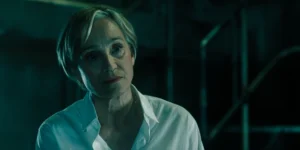The Maze Runner is a movie about boys, for boys. And I know it seems like I’m trying to be all cute using the word “boys” instead of “men” or “males” or whatever, but I mean that literally – this is yet another movie based on a Young Adult novel series which I, of course, have never heard of. Still, it must be pretty popular, because somebody thought it would be a good idea to commission (at least) three feature-length adaptations of the material, and who am I to argue with the infinite wisdom of Hollywood?
You know what’s surprising though? This is actually pretty good. At the very least it’s better than The Hunger Games, Divergent and The Giver, which put it firmly ahead of its immediate rivals in the race for my attention when we reach sequel time. It would have probably stayed there too, had it not essentially committed the cinematic equivalent of seppuku in the last ten minutes.
See, this is a film built on questions. Our hero – who looks like someone a group of teenage girls made in a lab – is hoisted into a capital-G Glade populated exclusively by fifteen-year-old lads. Who is he? Well, his name is Thomas, but it takes a little while for him to remember. Why is he there? What is the purpose of this Glade? For what reason is the whole thing surrounded by a giant maze which periodically opens and closes? While The Maze Runner continues to drip-feed us answers to these mysteries, it remains surprisingly interesting on a dramatic level; not to mention reasonably well-acted and competently-directed.
READ: Movies like The Maze Runner you must watch
But! Somehow the more we find out about this whole setup the less interesting it becomes, until we eventually reach the “there’s going to be a sequel!” finale and discover that not only have they gone for the absolute dumbest, most uninteresting reveal in the history of the universe, but they’ve elected to do it in literally the most boring and rote way possible: some character we’ve never seen sat in front of a monitor just openly explaining all the ludicrous reasons why this is happening.
Still, even though my interest in this series going forwards has pretty much evaporated, there’s a fair amount of enjoyment to be had in the film overall. For one thing the premise is immediately compelling without the need for any of that heavy-handed socio-political metaphor-spouting nonsense which seems to be the standard for stories like this. And even though the straightforward kid-friendly writing doesn’t mine much drama out of the male-dominated group dynamics, it’s still fun to watch them all bumble around and try to peel away the various layers of secrecy surrounding the maze and each other.
I especially like how their little hierarchy is rooted in angsty teenage bullshit rather than anything resembling logic. In any other context it would be really annoying, but it makes sense that these characters in this setting would behave in such a way. The biggest, most athletic tend to run shit, and the more interesting and/or heroic tasks are delegated to them. Some, for example, are known as Runners, and it’s their job to brave the maze itself and look for a way out, while the more mundane Glade-maintenance duties are left in the capable hands of the fat guy and the dorks.
The Runners’ task is particularly perilous for two reasons: one, because the maze is a maze and therefore there’s a good chance you might get lost in there; and two, the thing is populated by giant mechanical monstrosities known as Grievers. These things are far from the most well-designed or –animated inhabitants of the movie-monster menagerie, but they’re big and angry enough to do a more than competent job of livening up the maze. As none of the boys have the faintest hope of taking on the Grievers directly, action scenes are instead staged as large-scale, spectacle-rich chase sequences which work here in a way that the silly Scooby Doo jaunts through the forests of The Hunger Games could only dream of.
I’m still not entirely sure that Dylan O’Brien in the lead role is quite the megastar-making turn we’re being led to believe, but he’s perfectly competent. Kaya Scodelario as the obligatory female character introduced to kick-start the third act is, likewise, inoffensive – the actress is and always has been somewhat one-note, but she’s able to play that note with real skill when the situation calls for it. In this case she’s kept well within her range but given very little to do; she’s probably more important in subsequent books, but her late introduction here doesn’t allow the character to shoulder too much narrative weight. What might actually happen if a lone, good-looking teenage girl was inserted into a forest full of horny teenage boys who hadn’t seen a female in years is, thankfully, a question which remains unexplored.
Ultimately, The Maze Runner is a perfectly serviceable though unremarkable movie which is just about good enough throughout to make its eventual suicide a little more frustrating that it would otherwise have been. It has the best of intentions, which makes it tough to really dislike, but the moderately intriguing premise is undone almost entirely by the wonky climax and the desperate need to bait audiences into a sequel.




